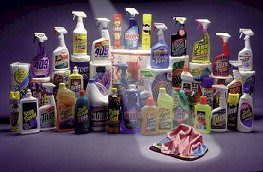Microfiber is a synthetic fiber made from polyesters and nylon. While it has been around for decades, it is still slowly finding its way into the cleaning product industry as a permanent replacement for traditional cleaning supplies. In nearly every aspect microfiber is superior to cotton mainstays. It is more absorbent, lasts longer, requires fewer chemicals, and is more cost effective. Whether you run a janitorial service, a small office, a warehouse, a restaurant, or are simply looking for a better home alternative, consider switching to microfiber.
Cost Effective
At first glance, microfiber comes off as expensive. This is much of the hesitation for most people considering switching. Microfiber mops can be 2-3 times more expensive up front than a cotton or rayon mop head. However, the extra expense pays off in the long run.
Expect somewhere between 500 and 750 washings for your microfiber mop heads. A the typical work environment this works out to a lifespan of well over a year. Traditional mop heads are doing well to endure two months of similar usage before needing replaced.
A microfiber mop can effectively clean a dirty floor using only water. If required, a minimum of chemicals can be used. This not only cuts down on your budget for cleaning chemicals, but is better for the environment. You will no longer be flushing high concentrate chemical water down your utility sink.
Water usage will be reduced substantially. One study showed that microfiber mops require approximately 1/10th the water needed by a traditional mop. This saving adds up quickly.
Since microfiber mops are so much more absorbent and use less water, your floor will not be left soaking wet after mopping. No more risking a law suit due to someone tripping over a recently mopped floor. This is especially important in a fast pace environment, such as a restaurant, hotel, or airport.
Better for the Company
While it may take some initial training and adjustments, employees will quickly learn to love mopping with microfiber. These mops weigh considerably less and don't require constantly bending over to wring out the water. This saves in expended labor, leaving your workers less worn out at the end of the day.
Mop heads can be used for one room and then tossed in a bag for later washing. Cross contamination is no longer an issue. Instead of mopping with dirty brown water after the first time you wring a mop out and constantly dumping it for fresh water, your bucket remains clean throughout the day.
Fewer trips to the utility sinks equates to less time spent mopping. This difference is especially important in larger facilities, where there may not be a utility room nearby at all times. Employees will appreciate not having to lift a large, heavy bucket of dirty mop water several times.
When it comes time to wash the mop heads, you can fit considerably more in a single wash. Fewer wash cycles adds up to more saved water and a further reduction in chemicals.
Microfiber Cloths
Mops are not the only place a business can make the switch. Replacing current terry cleaning cloths with microfiber towels gives similar benefits to switching over mops. These microfiber towels can be used for nearly anything from cleaning windows, polishing a car, wiping down a counter, or spill control.
Microfiber is more absorbent than terry cloth due to the tiny openings between fibers. Employees will use fewer towels for a cleanup job, and fewer chemicals for cleaning counters or windows (if chemicals are needed at all).
Cotton rags are prone to leaving lint on freshly clean windows. This gives the appearance of not having been well cleaned at all and is frustrating to everyone involved. Microfibers don't leave behind these annoying lint fibers, but leave only a pristine, clean appearance.
Microfiber cleaning supplies are here to stay. They are superior to traditional alternatives in nearly every aspect. Consider making the switch for your business or home. You will find that microfiber is a cost-effective, labor friendly, and long lasting solution to your needs.
Subscribe to:
Post Comments (Atom)


No comments:
Post a Comment